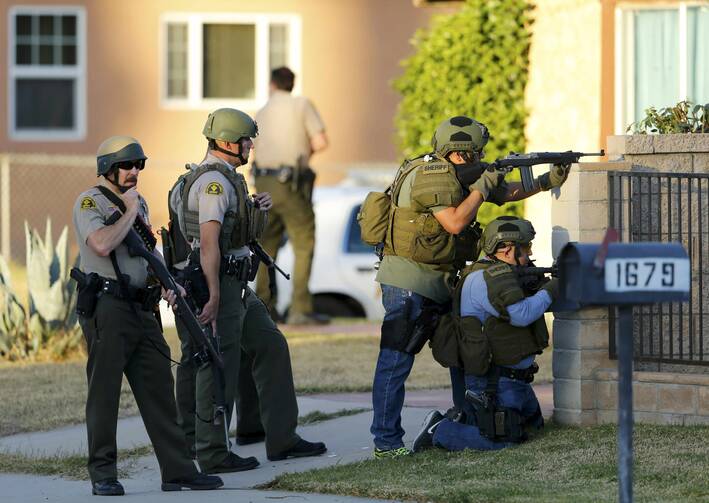This week’s mass shooting in San Bernardino was followed by the usual expressions of disbelief and anger that such incidents happen in the United States almost every day, with a backlash against prayer the only new wrinkle on an old story. ABC’s Rick Klein writes, “when it comes to mass shootings and their aftermath, the political class has failed”; but his point is smudged by evenhandedness: “From one side of the aisle, ‘thoughts and prayers’ and a call for a focus on mental health. From the other, ‘this must change’ and a push for gun control, of course.” Gun control, of course—how boring!
For half of America, the political class has not failed at all, but is instead to be praised for protecting the Second Amendment even when liberals (“bleeding hearts” may not work so well in this context) try to exploit tragedies like the one in San Bernardino, and in Colorado Springs last week. A lot of Americans are still upset about government-mandated low-flush toilets and the phase-out of incandescent light bulbs, so resistance to gun control should not be surprising. We’ve even reached the point where a U.S. senator muses about the tyranny of forcing food-service employees to wash their hands after using a bathroom. Even at gunpoint, they’re not about to back down from their belief that everything the government does is evil.
The Washington Post’s Jim Tankersley and Scott Clement write that the recent shift in public opinion against gun control can be attributed to a widening partisan divide: “From 1993 through 2007, [the Pew Research Center] documented a steady gap between Republicans and Democrats on the importance of gun rights versus gun control. Republicans tended to split about 50-50, and Democrats tended to break two-thirds in favor of gun control. That trend broke, and broke hard, after Barack Obama was elected president. Since 2008, Republican preference for protecting gun rights has risen to 75 percent. Democratic preferences have stayed basically level. The surge in support for gun rights in recent years, in other words, is entirely explained by the changing views of Republicans.”
Opposition to gun control is higher in gun-owning households, but a stronger factor is an individual’s view toward government. The Washington Post story also points to a 2012 poll in which 70 percent of all those who felt “government controls too much of our daily lives,” and 81 percent of Republicans who agreed with that statement, opposed stricter gun control laws (as opposed to 24 percent among those who disagreed that government controls too much). In a 2013 Pew poll, 68 percent of those who personally owned guns felt that stricter gun control laws “give too much power to government over ordinary citizens”—but 49 percent of those in households without guns also agreed with that statement, suggesting that ideology is a more important variable than the experience of actually owning firearms.
You could see the barriers against stricter in gun control in the comments of Republican presidential candidate Carly Fiorina. Back in October, in reaction to another mass shooting, she said new laws were unnecessary because “we don’t enforce the laws we have.” In a TV interview in South Carolina, she said, “we know a whole bunch of people who have guns and aren’t supposed to, they’re on a list, and yet we’re not doing anything about it. We’re not prosecuting them.” This week, appearing on MSNBC’s “Morning Joe” after the San Bernardino shooting, Ms. Fiorina again said, “We don’t enforce the laws we have,” claiming that only 1 percent of those illegally possessing firearms are ever prosecuted. But she opposed closing a loophole that allows suspected terrorists to legally purchase firearms, citing the case of “my best friend’s husband” being mistakenly added to a “watch list.” “If I had other faith in the competence of government,” she told her interviewers, “I would agree with that. But do you? I don’t!”
To sum up Ms. Fiorina’s argument: government should enforce existing gun-control laws, which don’t work, but government can never be trusted to do anything right anyway. No hope!
In his “political class has failed” note on ABC, Mr. Klein concludes, “the simple fact is that politicians and candidates aren’t feeling voter pressure to change their responses or their policy positions. Part of the ritual now is the numbness, followed by the forgetfulness.” But voter pressure is indeed a big factor in the lack of action in Washington, and Republicans are anything but forgetful in applying it.








